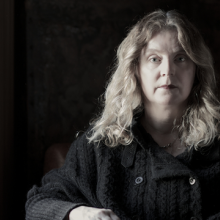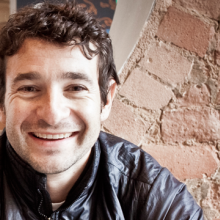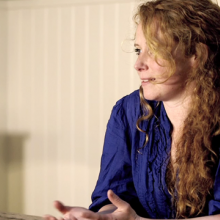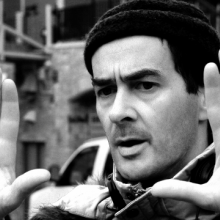Two-time BAFTA nominee Gurinder Chadha OBE has enjoyed an acclaimed film career as a writer/director, frequently in in collaboration with co-writer and husband Paul Mayeda Berges. she began as a radio reporter, before directing documentaries for the BBC, Channel Four and the BFI. Her feature debut came with Bhaji On The Beach (1993), followed by What's Cooking? (2000), Bend It Like Beckham (2002) and Bride And Prejudice (2004). Chadha's latest is Angus, Thongs And Perfect Snogging, a coming-of-age tale adapted from the first two books by Louise Rennison.
The title of Rennison’s first book was actually Angus, Thongs And Full Frontal Snogging but you’ve changed the title - how come?
We kept running into trouble with ‘full frontal’. When we were trying to get our permissions for the locations in Eastbourne there was this suspicion that we were making a porno film because we had ‘thongs’ as well as ‘full frontal’ in the title.
Were you tempted to stick with it anyway?
The real crunch came when the BBFC wouldn’t give us a PG rating with that title, because it was too suggestive. That meant our trailer couldn’t be shown with Mamma Mia!, so we changed it.
And this despite the big following that the books have?
When you see the book on the shelf, it’s different because it’s colourful, got a really bright cover design, very girlish writing and little diagrams and stuff. But when you’re looking at movies and wondering what to see, it takes a second or two to work out what it’s all about.
Have you ever felt constrained in your career by labels placed upon you, whether it be ‘female director’ or ‘Anglo Asian filmmaker’?
I think in America they don’t look at it like that. They think ‘do your films make money?’, and that’s the category. You’re either in that category and bring audiences in, or you win awards and get the critical impact but don’t expect to make too much money.
So how do they view you, do you think?
I suppose my ‘rep’ as they call it there, is that I can make films that bring audiences in. They are warm films and they can appeal to more than one ‘quadrant’, in their language.
Could you have envisaged the successful, international, directorial career you’ve enjoyed when you were making Bhaji On The Beach?
No. When I was shooting Bhaji On The Beach, I thought if I made a movie that held together I’d be happy. If it was good, that was a bonus. It was a real baptism of fire because of course I’d only done documentaries before, so I really did learn on the job.
But it still took a few years for your next film to be made. Was that down to the state of the British film industry at the time?
Partly, but also I wasn’t as savvy as I am now in terms of what kind of films get funded. Also I wasn’t a writer, I was a director. That period forced me to become a writer, because I wanted to read the scripts that I wanted to make.
"Once the movie starts, I make it for myself. The film has to be your own."
You’ve tried your hand at working in America. Does that still appeal to you?
I get offered things there all the time but I really have to think about it, because my heart does belong here. If I can make films that are culturally British but can appeal to anyone around the world I’d be happiest. There’s no reason why we can’t make more British films that are our stories, that can compete with Hollywood films.
Do you think we can consistently do that?
I don’t see why not. I think Angus looks fantastic. [Cinematographer] Dick Pope has done a fantastic job. It really looks better than a lot of American films. So in that aspect I think it’s great, and I think the audience will respond to the emotional beats in there.
You were working on a couple of high profile Hollywood movies that seemed ready to go prior to Angus. What happened with I Dream Of Jeannie?
There was a problem with casting. Kate Hudson was in one minute and then she was out. That was all to do with studio politics.
You also worked on the movie version of Dallas, didn’t you?
I worked on that with Robert Harling; it was really funny, very much about the Bushes and oil and Texas. John Travolta was attached as JR, Luke Wilson as Bobby, and Shirley MacLaine.
So what happened?
They did some research and found out that if you were under 38 you didn’t know the TV show. They worried about a younger audience not coming to see it, and that, of course, made me feel really old, because I do remember it.
You also found out you were pregnant around this time, didn’t you?
I did, and I thought they needed to make it there and then. I couldn’t hang around and they weren’t ready to give it the green light, so I moved on. I thought I’d rather come back to London and have my children here.
You have twins, a boy and a girl who are now just over a year old. Do you detect a difference in them even at this early stage in their lives?
Absolutely. My girl is very, very delicate and feminine and soft and gentle, and yet you can’t even hold my son without him trying to do somersaults in your arms.
Will motherhood change your approach to directing?
Possibly yes. I do lots of things differently now, like crossing the road. I wait for the ‘green man’ before I cross the road. Everything means more and is so much more emotionally loaded. I’m absolutely certain I’ll be a different director.
Will you be as willing to travel, for example?
Having had the children I do feel as though I want to stay here, really. But Paul’s from LA, so the children have got American grandparents as well. If a really good project does come up out there I probably will go and do it.
You enjoyed a breakthrough in Hollywood with Bend It Like Beckham. Does it occur to you that you made David’s transfer to LA Galaxy possible?
When I saw that, I thought ‘$125 million, where’s my share David?’ When I started doing press in America for that film, people were like: ‘Who’s Beckman? What is Beckman?’
You were anxious at the time that he approved of the film, which he did in the end, didn’t he?
He did, and he wanted to come to the premiere but then he broke his foot. Then, of course, it was ‘Mend It Like Beckham’.
Does the audience appeal of your films mean you ever have to compromise your own vision?
I set out to get as wide an audience as possible but I do that in my choice of film, the script and the casting. Then, once the movie starts, I make it for myself. The film has to be your own; if it works for me, then I’m happy.
What’s the key to working with younger actors?
I try not to be intimidating; there’s so much going on around them that is intimidating. At the same time, I try to create this atmosphere where it’s okay to laugh and it’s okay to have fun.






